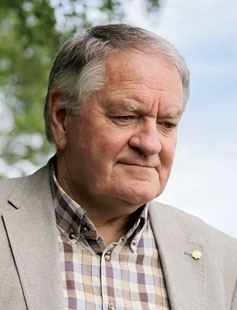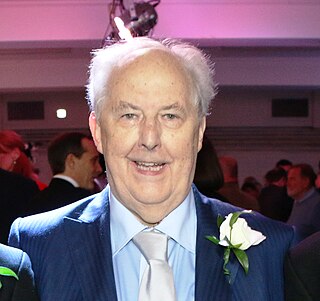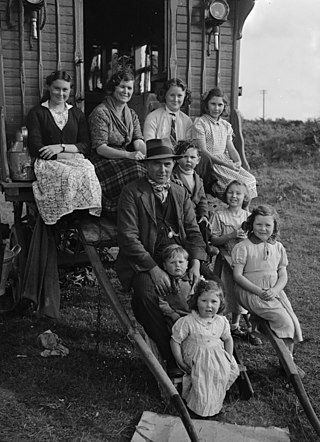Related Research Articles

Cymru ( ) is the Welsh-language name for Wales, a country of the United Kingdom, on the island of Great Britain.

The Welsh Language Society is a direct action pressure group in Wales campaigning for the right of Welsh people to use the Welsh language in every aspect of their lives. The chair of the Welsh Language Society since October 2023 is Joseff Gnagbo.

Dafydd Iwan Jones is a Welsh singer and nationalist politician who rose to fame writing and performing folk music in the Welsh language. From 2003 to 2010, Iwan was the president of Plaid Cymru, a political party which advocates for Welsh independence from the UK.
Islwyn Ffowc Elis was one of Wales's most popular Welsh-language writers.

Welsh nationalism emphasises and celebrates the distinctiveness of Welsh culture and Wales as a nation or country. Welsh nationalism may also include calls for further autonomy or self-determination, which includes Welsh devolution, meaning increased powers for the Senedd, or full Welsh independence.
Robert Maynard Jones, generally known as Bobi Jones, was a Welsh Christian academic and one of the most prolific writers in the history of the Welsh language. A versatile master of poetry, fictional prose and criticism, he was born in Cardiff in 1929, educated at the University of Wales, Cardiff and University College Dublin. Jones held the chair in Welsh language at Aberystwyth from 1980 until his retirement. He died on 22 November 2017.
Morgan Llwyd was a Puritan Fifth Monarchist and Welsh-language poet and prose author.

Llwybr Llaethog are an experimental Welsh language band that effectively mix such varied musical genres as rap, dub, reggae, hip hop, and punk in their music.

The Reports of the Commissioners of Inquiry into the State of Education in Wales, commonly referred to in Wales as "The Treason of the Blue Books" or "The Treachery of the Blue Books" or just the "Blue Books" are a three-part publication by the British Government in 1847, which caused uproar in Wales for disparaging the Welsh; being particularly scathing in its view of the nonconformity, the Welsh language and the morality of the Welsh people in general. The Welsh sobriquet Brad y Llyfrau Gleision was from the name of a play satirising the reports, and those who gave evidence to the inquiry, which was published seven years after the reports. The Welsh Academy Encyclopaedia of Wales says that the name "took hold of the public imagination to such an extent that ever since the report has been known by that name".
John Williams, was an antiquary and Anglican priest. Born in Llangynhafal, Denbighshire Wales in 1811, he graduated from Jesus College, Oxford in 1835 to become the Anglican curate of Llanfor, Merionethshire, where he married Elizabeth Lloyd Williams. In 1843 he became perpetual curate of Nercwys, Flintshire, and rector of Llanymawddwy, Merionethshire, in 1849.
The Wales Book of the Year is a Welsh literary award given annually to the best Welsh and English language works in the fields of fiction and literary criticism by Welsh or Welsh interest authors. Established in 1992, the awards are currently administered by Literature Wales, and supported by the Arts Council of Wales, Welsh Government and the Welsh Books Council.

David Benjamin Rees is a Welsh and English-language publisher, author, lecturer and minister in the Presbyterian Church of Wales since 1962. He is a leader of the Welsh community in Liverpool, and heads one of the city's five remaining Welsh chapels. His small publishing house, Modern Welsh Publications Ltd, was established in 1963 and from 1963 to 1968 it operated from Abercynon in the Cynon Valley of South Wales. Since 1968 it has operated from Allerton, Liverpool and is the only Welsh language publishing house still operating in the city of Liverpool.
The Tir na n-Og Awards are a set of annual children's literary awards in Wales from 1976. They are presented by the Books Council of Wales to the best books published during the preceding calendar year in each of three awards categories, one English-language and two Welsh-language. Their purpose is "[to raise] the standard of children's and young people's books and to encourage the buying and reading of good books." There is no restriction to fiction or prose. Each prize is £1,000.

Meredydd Evans, known colloquially as Merêd, was a collector, editor, historian and performer of folk music of Wales. A major figure in Welsh media for over half a century, Evans has been described as influencing "almost every sphere of Welsh cultural life, from folk music and philosophy to broadcasting and language politics".

The Kale are a Romani subgroup predominantly found in northwestern Wales, specifically in the Welsh-speaking areas. Romani have been present in Wales since the 16th century.
Steve Eaves is a Welsh poet, songwriter and singer, working in the Welsh language. He has lived for most of his life in the Bangor area of North Wales. He has been a performing musician for over 45 years. During the late 1960s and early 1970s he worked as a labourer and musician, with frequent forays to Chester, Crewe and other locations to perform at folk clubs and underground venues of the period. He also performed at the now legendary Les Cousins folk club in Soho, sharing the floor spot with legendary blues singer Jo Ann Kelly. He also performed with various 'underground' luminaries of the time such as Al Stewart, Tea and Symphony, and the Sutherland Brothers.
Meic Stephens, FLSW was a Welsh literary editor, journalist, translator, and poet.
Geraint Huw Jenkins, FBA, FLSW is a historian of Wales and a retired academic. He was Professor of Welsh History at the Aberystwyth University from 1990 to 1993, when he became Director of the University of Wales Centre for Advanced Welsh and Celtic Studies. In 2009, he retired from academia and was appointed Professor Emeritus of Welsh History at the University of Wales.
Undeb Cymru Fydd was a Welsh patriotic and cultural society. It was founded in 1941 when Undeb Cenedlaethol y Cymdeithasau Cymreig and Pwyllgor Amddiffyn Diwylliant Cymru merged to form a new organization with the aim of promoting Welsh culture and the Welsh language and to be the focus and medium of cooperation for that purpose. The new organization took the name of the earlier patriotic movement Cymru Fydd, which was established in 1886.
Dyfodol i'r Iaith is a non-party political organisation in Wales that works to ensure that the Welsh language occupies a central role in Welsh life and remains a priority on the political agenda. It is a lobbying pressure group which works exclusively through constitutional means, seeking to influence the Welsh Government, local government, political parties, the heads of public bodies and others to place the language at the heart of their policies and actions.
References
- 1 2 "Dr Simon Brooks, Associate Professor, Business". Swansea University. Retrieved 9 September 2021.
- ↑ Dr Simon Brooks (March 2021). Second homes: Developing new policies in Wales (PDF) (Report). Welsh Government. ISBN 978-1-80082-858-2 . Retrieved 8 September 2021.
- ↑ Cymru, Arsyllfa. "Second Homes – Developing new policies in Wales report by Dr Simon Brooks". Observatory. www.arsyllfa.cymru.
- ↑ James, Julie. "MS" (PDF). Welsh Government website. Welsh Government.
- ↑ "Written Statement: The effects of Covid-19 on Welsh language community groups – survey findings". Welsh Government. Retrieved 9 September 2021.
- ↑ "The effects of COVID-19 on Welsh language community groups: government response". Welsh Government.
- 1 2 "Pam Na Fu Cymru - Methiant Cenedlaetholdeb Cymraeg". University of Wales Press. Retrieved 9 September 2021.
- ↑ "Cyhoeddi rhestr fer gwobr Llyfr y Flwyddyn 2016". BBC Cymru Fyw. May 19, 2016.
- ↑ "Why Wales Never Was: The Failure of Welsh Nationalism". University of Wales Press. Retrieved 7 September 2021.
- ↑ Williams, Huw. "Institute of Welsh Affairs". Institute of Welsh Affairs. IWA. Retrieved 9 September 2021.
- ↑ Francon, Gwenno (20 April 2013). "Book in line for top award". Daily Post. Retrieved 9 September 2021.
- ↑ "O Dan Lygaid y Gestapo - Yr Oleuedigaeth Gymraeg a Theori Lenyddol yng Nghymru". University of Wales Press. Retrieved 9 September 2021.
- ↑ "Why Welsh has always been a multi-ethnic and multi-cultural language". Nation Cymru. Nation Cymru / elsh Books Council.
- ↑ "Review – Adra by Simon Brooks". Nation Cymru. Retrieved 9 September 2021.
- ↑ "New Welsh language pressure group Dyfodol i'r Iaith". BBC News. 16 July 2012. Retrieved 9 September 2021.
- ↑ Huw Williams (17 July 2015). "Pam Na Fu Cymru – Why Wales Never Was". IWA. Retrieved 28 May 2017.